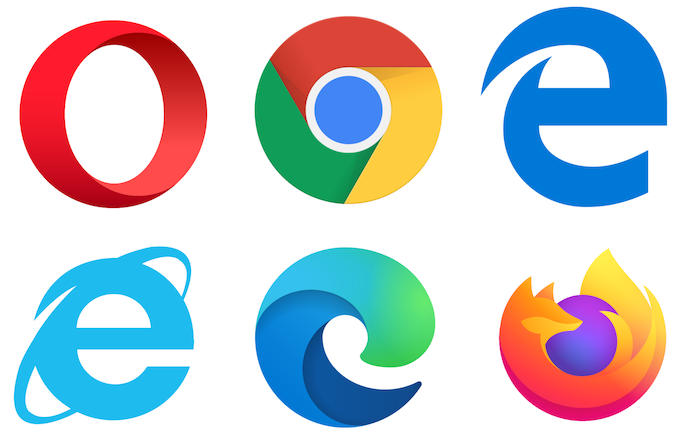The 2020 Browser Battle: Surfing With Speed
by Brett Howse on September 10, 2020 8:00 AM EST- Posted in
- Software
- Browsers
- Mozilla
- Google Chrome
- Microsoft Edge

Accessing the internet is one of the most basic tasks for any computer, but webpages in 2020 are incredibly complex so how the browser interprets the code and renders it as a viewable webpage is no simple task. Modern browsers have both a rendering or layout engine, as well as a scripting engine, and both factor into how well the browser can handle any particular task.
When the web first evolved, it was more or less a static affair, with webpages laid out in HyperText Markup Language, otherwise known as HTML, but as time passed websites became more and more complex, with it not uncommon today to run applications that would have been compiled programs several years ago. As such, browser performance is still an especially important metric for any PC user.
For 2020, the browser landscape has been shaken again, with Microsoft abandoning their closed source browser and moving over to the open source Chromium project, which as the name suggests, is the basis for the popular Google Chrome browser. After being in development for over a year, Microsoft has started updating Windows 10 PCs from Edge based on EdgeHTML to the Chromium Edge. As such, we figured it was a good chance to take stock of the browser landscape and see how some of the more popular browsers fare in terms of performance and battery life.
Although the web is based on HTML, with a standards body approving changes to the base HTML and therefore a level playing field, over the years it has never worked out quite as well as hoped, with web developers focusing on particular browsers that are popular or they are comfortable with, so over the years we have seen quite a few periods where specific browsers have been favored over others. Most readers will likely remember the days of Microsoft’s Internet Explorer 6 dominance, where websites would often only work in IE 6 thanks to heavy use of ActiveX. Internet Explorer has been a dominant feature of business and enterprise intranet sites, to the point where Microsoft is still forced to include and update their ancient browser even as they would like to move on. But that was certainly not the only time that has happened. Microsoft had the shoe on the other foot with the rise of mobile computing, where Webkit was the predominant browser thanks to Apple’s Safari browser on iOS, and Google using Webkit as the basis for Chrome as well.
What this means is that the web landscape, despite being open thanks to a standards body, has never felt as open as it could have been. One dominant platform or another has tended to be the one to drive developers to utilize new features that may not yet be ratified as web standards, or not yet supported by other browsers. So, although there is likely a group of people happy to see Microsoft abandon their own browser engine and move to Chromium, for the web it is not necessarily a net positive to see so much consolidation.
Today’s web landscape heavily favors browsers based on Chromium, which of course includes Google Chrome, but also the new Microsoft Edge, as well as Opera, Vivaldi, Brave, and quite a few more. Mozilla Firefox is the rare exception, with Mozilla developing their own browser engine in Gecko with Spidermonkey for scripting. Apple continues to offer Safari with Webkit, of which Chromium forked into Blink back in 2012.
| 2020 Web Browser Comparison | |||||
| Name | Rendering Engine | Scripting Engine | Version Tested | ||
| Google Chrome | Blink | V8 | 84 | ||
| Microsoft Edge Classic | EdgeHTML | Chakra | 18 | ||
| Microsoft Edge Chromium | Blink | V8 | 85 | ||
| Mozilla Firefox | Gecko | SpiderMonkey | 79 | ||
| Opera | Blink | V8 | 70 | ||
| Internet Explorer | Trident | Chakra (JScript) | 11 | ||
| Apple Safari | WebCore | JavaScriptCore | Not Tested | ||
Although each browser has their own advantages in terms of features, design, and privacy, today we are going to just focus on how each browser performs. When an application is run on your desktop, most of the time it is going to be code that is written, then compiled. On the web, the code is not compiled, and instead the browser relies on its ECMAScripting engine to perform Just-In-Time (JIT) compilation. Because of this, browser performance is heavily impacted by how that scripting engine performs. We have seen advances in the scripting engine improve browser performance over time, as well as sometimes finding degradation as the engine is updated. And, of course, from time to time we have seen various vendors add specific code to deal with popular scripting benchmarks of the day.
The other side of the equation is battery life, meaning how efficient the browser and scripting engine is. The decline of the desktop has been happening for years with laptop sales continually outpacing desktops, so more battery life from your browser is likely a welcome addition.
For this test, we will be focusing on some of the more popular browsers available on the PC. As more of them consolidate around Chromium, we figured it was a good chance to look at how each browser performs, as well as look at the outgoing Microsoft Edge and even Internet Explorer to see if Microsoft has had to sacrifice performance during this transition.











121 Comments
View All Comments
biofrog - Thursday, September 10, 2020 - link
Thanks, very interesting.I thought I'd try my real-life test opening a 49MB HTML log file. Time to finish loading was:
Chrome: 14 minutes 46 seconds
Firefox: 7 seconds
Edge: cant even open local files
IE: 12 seconds
Nope, still not going to use Chrome until they get that fixed. It used to work around v50-ish. At roughly 12,657 times slower than Firefox, it seems Chrome isn't feasible for my work.
Khenglish - Friday, September 11, 2020 - link
Can we get a RAM usage comparison for similar tasks? Historically I used to see Chrome use the most memory, and edge classic use the least. Lately Firefox seems to be using ridiculous amounts of memory. It'd be good for a more in depth comparison.RickyBaby - Friday, September 11, 2020 - link
I'll echo the sentiments of several others. My #1 concern is the ability of a browser to protect my privacy and block ads. NOTHING ELSE COMES CLOSE. Why doesn't AT or any other site respect our wishes and provide the details we actually want to know ? And, yes, you already know the answer. GOOGLE IS EVIL. Apple, MS are no different. Is it true that FF is owned by the Chinese and our data is mined and sent there ? That's what we really want to know ... along with which plug-ins work best is stopping the spying ? How about a review of TOR browser ? Yeah. Right. We get it. AT and all the other tech sites are owned by the same EVIL we are trying to avoid. Pretty much figure that I just got banned. And since I'm going down ... FB is EVIL too. Twitter is EVIL. Both ban anyone who isn't complicit to their EVIL. What the hell happened ? Speaking for the average geek ... we want our internet back and yes it was stolen from us. Thanks.The Garden Variety - Friday, September 11, 2020 - link
So, other than that, Ms. Lincoln, how was the play?Tewt - Thursday, September 24, 2020 - link
I agree, RickyBaby. I think there is too much curation on the internet. The fun of discovery of new sites and ideas appears to have vanished. Now, most of my results always bring back just the top news(political, tech, life, etc) sites or retailers. It feels like there are no new discoveries. I used to be able to go back 10, 13, 20 pages and there would be a ton of different websites. Now, each page is mostly the same. That is boring and stifling.lmcd - Friday, September 11, 2020 - link
None of these benchmarks would even be relevant if Mozilla had the muscle that the Chrome team does. Instead, all of our JS libraries would interop with asm.js utility libraries, and Chrome's weak optimizations there would lead to massive performance wins for Firefox.It's disgusting to me how the Chrome team gets to pick and choose the standards that win. Their selections are regularly wrong, sometimes outright harmful.
Sivar - Friday, September 11, 2020 - link
I like Edge overall, but it occasionally freezes when loading a website. The browser is still responsive, the "Loading" notification appears, but that tab is permanently defunct. It will never, ever load the page. It won't respond to a refresh request. I have to close it and open the same page in another tab, which has so far always immediately loaded.This happens on both Windows 10 and iPhone, with or without extensions.
six_tymes - Friday, September 11, 2020 - link
the new edge has been the fastest browser since December of 2019.OreoCookie - Sunday, September 13, 2020 - link
Edge has replaced Chrome on my Mac. Their UI isn't as good as Safari, but it is a capable and fast browser. The only criticism — which isn't really Microsoft's fault — is that the number of ads in Youtube has exploded. That shows me *how much* Google syphoned off my personal data in return. Not cool and I am glad to suffer a tad to have a shred more privacy.GeoffreyA - Saturday, September 12, 2020 - link
Have been using Firefox for a few years and am quite happy with it. Used to use Chrome on the desktop, though admittedly, still on my phone (along with Opera). As for IE, with all its faults, I think many, like myself, feel a bit nostalgic towards it.